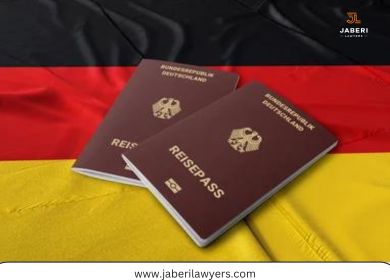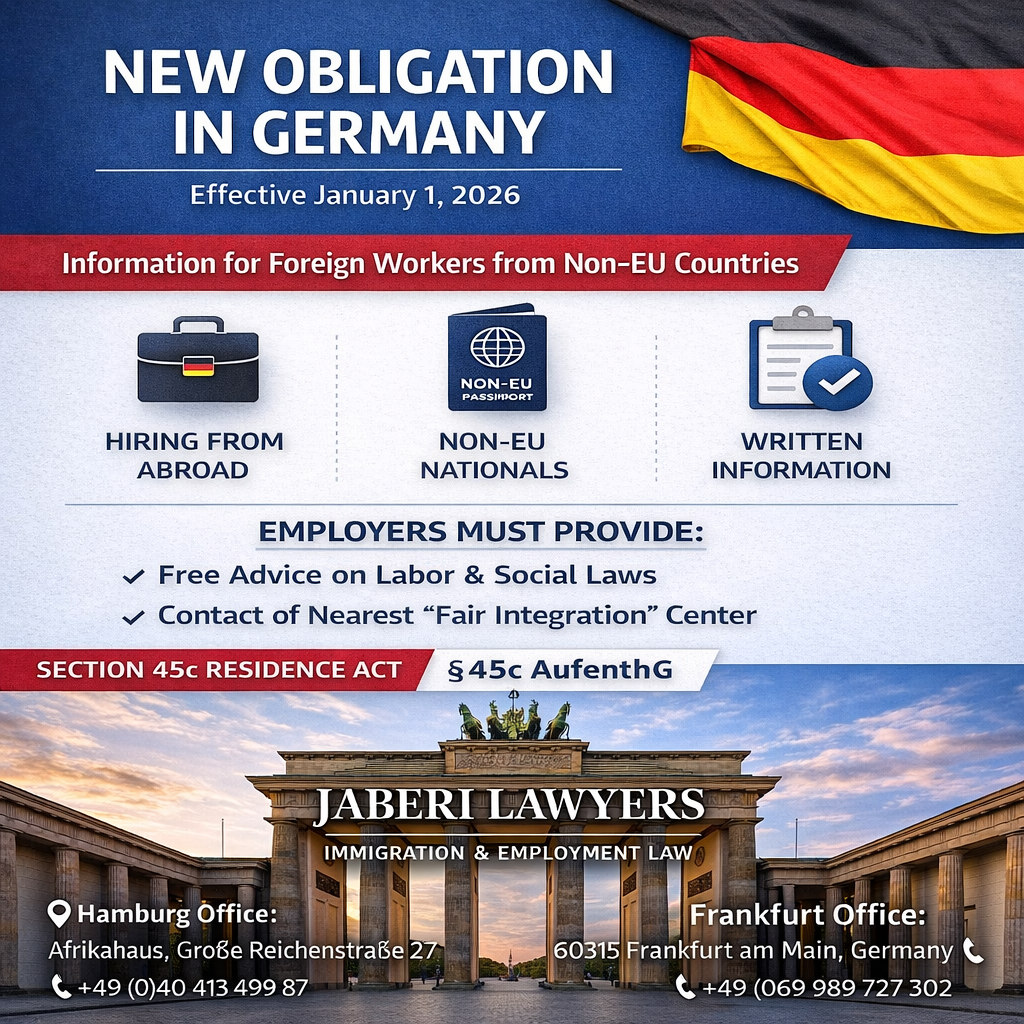Germany has officially introduced major reforms to its citizenship and naturalisation laws in 2024–2025, marking a historic shift in how foreign nationals can become German citizens. The goal is to make naturalisation faster, more inclusive, and more aligned with Germany’s modern immigration goals.
If you are a long-term resident, skilled professional, or family member of a German citizen — this update could significantly benefit you.
Let’s explore what has changed, who qualifies, and how Jaberi Lawyers can help you navigate the new rules confidently.
🕐 1. Reduced Residency Requirement: From 8 Years to 5 Years
One of the most important changes is the shortened minimum residency period.
Until recently, applicants needed to live in Germany for at least 8 years before applying for citizenship. Under the 2025 reform, this period is now reduced to 5 years — or even 3 years in special cases.
You can apply after:
5 years of legal residence in Germany under normal circumstances.
3 years if you have demonstrated special integration achievements, such as:
Completing a German vocational training or university degree.
Exceptional professional, academic, or social contribution.
Proficiency in the B1/B2 level German language or higher.
This change opens the door for many skilled workers, students, and professionals who want to settle in Germany permanently.
🧾 2. Dual Citizenship Now Officially Permitted
Another historic change: Dual nationality is now allowed for many categories of applicants.
Previously, non-EU citizens had to renounce their original citizenship before becoming German. This often discouraged eligible migrants from applying.
Under the new reform, you can now keep your original nationality while obtaining a German passport, giving you:
Freedom of movement within the EU.
Stronger job opportunities across Europe.
Enhanced travel freedom to more than 190 countries.
This change reflects Germany’s growing need for global talent — and its recognition of multiculturalism as a national strength.
👨👩👧 3. Easier Citizenship for Children Born in Germany
If your child was born in Germany, they may now automatically qualify for German citizenship if at least one parent has been legally living in Germany for five years.
This replaces the older rule that required eight years of residence.
It’s a significant advantage for families who have built their lives here and wish to secure their children’s future under German nationality.
🏛️ 4. Naturalisation Without Losing Integration Standards
Even though Germany is making citizenship faster and more flexible, integration remains essential.
Applicants still need to:
Demonstrate knowledge of the German language (B1 minimum).
Show understanding of Germany’s legal and social order.
Prove financial stability (no dependency on Bürgergeld or social welfare).
However, the authorities are adopting a more balanced and humane approach, taking into account real-life circumstances such as temporary unemployment or family situations.
🌍 5. Recognition of Long-Term Contributors & Workers
Germany’s updated naturalisation law highlights the contributions of skilled professionals, international students, and foreign workers.
If you have:
Been working and paying social security contributions,
Completed recognized vocational training, or
Earned a university degree in Germany,
you are now viewed as a valuable part of the German workforce and may be eligible for accelerated naturalisation.
This is particularly good news for people holding EU Blue Cards or permanent residence permits, as their professional contribution is now given higher recognition.
💡 6. What This Means for You
The new law simplifies and shortens the road to citizenship, but accuracy and preparation are still critical. Every applicant’s background — visa history, family situation, qualifications, and residence type — can affect eligibility.
A small documentation error or misunderstanding of eligibility rules can delay or even reject your application. That’s why professional legal assistance is essential.
⚖️ How Jaberi Lawyers Can Help
At Jaberi Lawyers, we combine legal precision with years of expertise in immigration, naturalisation, and nationality law.
Our multilingual team assists individuals and families through every step — from residence permit extensions to full German citizenship.
We help you with:
Eligibility assessment under new 2025 rules
Document verification and application preparation
Legal representation in case of delays or refusals
Guidance on keeping dual citizenship legally compliant
Where Immigration Meets Expertise – Jaberi Lawyers stands by your side to make your journey towards German citizenship smooth, transparent, and successful.
📞 Contact Us
Jaberi Lawyers
Afrikahaus Große Reichenstraße 27
20457 Hamburg
📞 +49 (0)40 413 499 87
Branch Office:
Große Gallusstraße 14
60315 Frankfurt am Main
📞 +49 (0)69 989 727 302
📧 contact@jaberilawyers.com
🌐 www.jaberilawyers.com
-
Phone Number
+49 (0)40 413 499 87
-
Email address
contact@jaberilawyers.com
`

Back to top

Germany Citizenship & Naturalisation 2025: What Has Changed and What You Must Know
- 2 November, 2025
News & Insights






